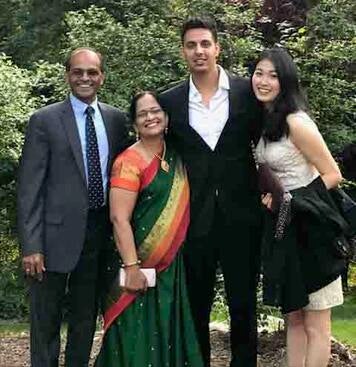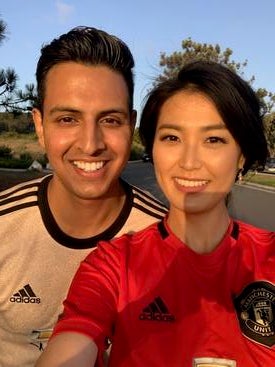
Assistant Professor of Accounting Aruhn Venkat likes the opportunities studying and practicing within the taxation arena. “Accountants, economists, lawyers, and political scientists all study taxation; it encompasses several disciplines in one area,” says Venkat. “For instance, economists care about the modeling implications of tax policy; lawyers care about explaining what the law means; and political scientists care about ‘how the sausage gets made.’
“I like thinking about all of these things.”
One of the reasons he likes contemplating all the facets of taxation is that his academic research is focused on business taxation and tax policy—specifically, the effects on labor outcomes, investment, and innovation, and other areas.
“Taxation affects everyone. It is the most important fiscal policy tool that governments have,” he says. “When the government needs to raise money, it raises taxes. When the government wants to incentivize behavior, it very often implements its objectives through taxation.
“At the same time, tax law is nuanced, complicated, and can be ostensibly illogical at times. Most people shudder when they think of reading the tax code or even doing their own taxes. That makes it a fun puzzle to unravel—I like the idea of identifying the unforeseen or unpredictable consequences of complex policies.”
Accounting, Taxation, and the Law
Venkat begins his career as a UCR faculty member this fall quarter, and he comes to the School of Business from UT Austin’s McCombs School Business, where he taught for five years. Born and raised in Las Vegas, he was a pre-law undergrad at the University of Southern California, and he says, “I took a broad range of classes—economics, politics, accounting, math, music, etc.—and I decided I wanted to be a tax lawyer with a JD.”
He earned a master’s degree in economics from American University and a J.D. from the Boyd School of Law at the University of Nevada, Las Vegas, and he is an inactive member of the Nevada Bar Association.
“I was advised by both my law and accounting professors that I should consider a career in academia,” says Venkat. So, he also earned a Ph.D. in accounting at UC Irvine’s Paul Merage School of Business, he adds, “because I was interested in empirical answers. As a lawyer, I was equipped to study tax qualitatively, but I wanted to also study it quantitatively.”
In the Classroom, the ‘Wrong’ Answers Are OK
Venkat aims to make the classroom a comfortable place for students, but when he asks questions, he expects answers, even incorrect answers.
“I am very interactive, and I want students to feel comfortable being ‘wrong’ when answering or asking unusual questions,” says Venkat, who will teach the BUS 20 Financial Accounting and Reporting course at the School of Business. “I find that ironing things out in class is best for everyone.”
As he reflects on his own experience in college, he says: “When I was a student, most of my classes were lecture-based. I do lecture in my classes, but I try to keep things lively with questions and student interaction.
“I also relate classroom material to real-world events and practical application as much as possible. Students find that the material is more engaging that way.”
Even before Venkat meets his new students, he has some advice for those who may be considering studying accounting: “If you are anything like me, you will change your mind a few times about your career. If you’re not like me, you know exactly what you want to do. In either case, accounting is a great major to choose.
“Accounting majors go on to become CPAs and bankers, but also lawyers, nonprofit founders, and tech entrepreneurs. Accounting gives you a skillset that is in demand across multiple industries. I can only see a promising future for the discipline.”
Returning to California and Joining the UCR School of Business
There are three reasons Venkat decided to teach at the School of Business. “First, I wanted to join a growing, dynamic business school where I could make a lasting impact,” he says. “UCR’s business school is expanding and focused on the future, and at the same time, it is small enough for my full range of skills and characteristics to be utilized.”
He was also looking for a robust research culture focused on growth. “The School of Business has a strong academic reputation yet is still focused on expanding that reputation,” he adds.
Outside of work, Venkat and his wife, Yoojin Lee, enjoy attending sporting events, and he spends time with his parents, sister, and two nephews. “I love Southern California. I’ve lived here for a good portion of my life,” he says. “I couldn’t resist the opportunity to jump back into the great weather and great vibes out here.”
Bonus: Research to Read
Of Venkat’s recent research, he suggests these papers and provides synopses of findings that would be of interest to those working both in and outside of the taxation trade:
“The Effects of Tax Avoidance News on Employee Perceptions of Mangers and Firms: Evidence from Glassdoor.com Ratings” published in The Accounting Review, 2021, co-authored by Venkat, Yoojin Lee, Shaphan Ng, and Terry Shevlin:
“In this article, we find that employees perceive their employers and managers more negatively when news breaks that their employer was involved in a tax avoidance scheme,” says Venkat. “Our finding suggests businesses may want to consider the risk that employees are demoralized before putting in place tax avoidance schemes.”
“The Deterrence Effects of Tax Whistleblower Laws: Evidence from New York’s False Claims Acts” published in Management Science, 2024, also co-authored by Venkat, Lee, Ng, and Shevlin:
“This article is a bit more nuanced but interesting nonetheless,” says Venkat. “We study New York’s tax whistleblower law, which incentivizes tax whistleblowers by giving them a cut of any back taxes recovered. New York hoped to catch more tax cheats using the law. However, the law may also incentivize frivolous litigation. Our main finding is that firms do reduce their tax avoidance when subject to the law, but some firms also leave the state rather than face the law. Our finding essentially suggests that policymakers should be careful in designing these laws to reduce tax avoidance but to also avoid losing businesses.”
“Corporate tax subsidies, local spillovers and corporate innovation” co-authored by Venkat, Lee and Ng, under review:
“This paper is unpublished but important because the news coverage of corporate subsidies is highly negative. We show that corporate tax subsidies can, in fact, have some benefits to local areas. We study the giant state and local tax subsidies, which local governments use to attract businesses. For example, Tesla receives giant subsidies to locate new manufacturing facilities in places like Nevada and Texas. Governments hope these subsidies lead to job creation. Most studies find that they are ineffective at creating jobs or enhancing investment.
“We take a different approach. We study whether these subsidies have benefits for incumbent, local firms. Specifically, we find that these subsidies increase local firms’ innovation. Take patents for example. Our results suggest that when a subsidy attracts a Tesla Gigafactory to a place like Reno, Nevada, local firms in Reno increase their patenting. We attribute this to knowledge spillovers: Tesla bring new knowledge and practices to the local area that weren’t there before. As this knowledge spreads, local firms can benefit by using it in their own production, leading to new ideas and patents.”

